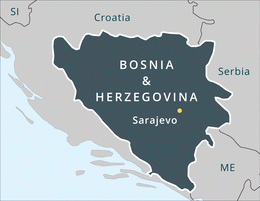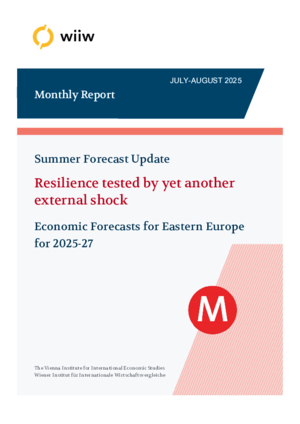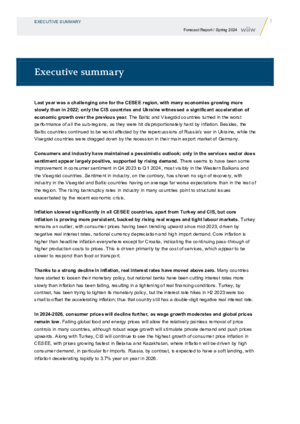Bosnia and Herzegovina

In the first half of 2025 the economic activity signals were mixed. Industrial output rose in the first four month, but retail sales declined. Meanwhile credit activity remained sluggish, reflecting the impact of higher interest rates. Nevertheless, over the course of the year private consumption is expected to strengthen, supported by rising real wages following an increase in the minimum wage. The widening trade deficit in the first four months points to stronger domestic demand, with higher imports reflecting improved economic activity. Despite weaker public spending and potentially softer investment, we are maintaining our GDP growth forecast for 2025 at 2.4%. This is underpinned by stronger EU demand than last year and a gradual recovery in household consumption. Inflation remains elevated, averaging above 3% in the first four months of 2025. As a result, we have revised our annual inflation forecast slightly upward, to 2.5%. Political tensions remain high following the Bosnian court’s issuing of an arrest warrant for Republika Srpska President Milorad Dodik. This risks further destabilising the country, with potentially negative implications for economic development and progress towards EU accession.
| |
|
|
|
FORECAST* |
| Main Economic Indicators | 2022 | 2023 | 2024 | 2025 | 2026 | 2027 |
| Population, 1000 persons | 3434 | 3422 | 3414 | . | . | . |
| GDP, real change in % | 4.2 | 2.0 | 2.5 | 2.4 | 2.8 | 3.2 |
| GDP per capita (EUR at PPP) | 12350 | 13600 | 14410 | . | . | . |
| Gross industrial production, real change in % | 0.9 | -3.9 | -4.0 | . | . | . |
| Unemployment rate - LFS, in %, average | 15.4 | 13.2 | 12.6 | 12.3 | 11.9 | 11.5 |
| Average gross monthly wages, EUR | 881 | 995 | 1093 | . | . | . |
| Consumer prices, % p.a. | 14.0 | 6.1 | 1.7 | 2.5 | 2.0 | 1.8 |
| Fiscal balance in % of GDP | -0.4 | -1.2 | -0.5 | -0.7 | -1.0 | -1.0 |
| Public debt in % of GDP | 29.3 | 26.4 | 27.5 | . | . | . |
| Current account in % of GDP | -4.4 | -2.3 | -4.2 | -4.8 | -4.9 | -4.9 |
| FDI inflow, EUR m | 806 | 957 | 1041 | . | . | . |
| Gross external debt in % of GDP | 51.6 | 47.4 | 50.0 | . | . | . |
Basic data are continuously updated.
* Forecasts are changed beginning of January, April, July and November.
See Press Conferences.
publication_icon
Monthly Report No. 7-8/2025
Vasily Astrov, Alexandra Bykova, Selena Duraković, Meryem Gökten, Richard Grieveson, Maciej Grodzicki, Ioannis Gutzianas, Doris Hanzl-Weiss, Gabor Hunya, Branimir Jovanović, Niko Korpar, Dzmitry Kruk, Sebastian Leitner, Isilda Mara, Emilia Penkova-Pearson, Olga Pindyuk, Sandor Richter, Marko Sošić, Bernd Christoph Ströhm and Maryna Tverdostup
wiiw Monthly Report No. 7-8, July-August 2025
38 pages including 5 Tables and 3 Figures
Details
publication_icon
Executive summary
Olga Pindyuk
in: The Crisis is Over, but its Scarring Effects are Hindering Recovery
wiiw Forecast Report No. Spring 2024, April 2024 , pp. I-VII
Details
In the first half of 2025 the economic activity signals were mixed. Industrial output rose in the first four month, but retail sales declined. Meanwhile credit activity remained sluggish, reflecting the impact of higher interest rates. Nevertheless, over the course of the year private consumption is expected to strengthen, supported by rising real wages following an increase in the minimum wage. The widening trade deficit in the first four months points to stronger domestic demand, with higher imports reflecting improved economic activity. Despite weaker public spending and potentially softer investment, we are maintaining our GDP growth forecast for 2025 at 2.4%. This is underpinned by stronger EU demand than last year and a gradual recovery in household consumption. Inflation remains elevated, averaging above 3% in the first four months of 2025. As a result, we have revised our annual inflation forecast slightly upward, to 2.5%. Political tensions remain high following the Bosnian court’s issuing of an arrest warrant for Republika Srpska President Milorad Dodik. This risks further destabilising the country, with potentially negative implications for economic development and progress towards EU accession.


